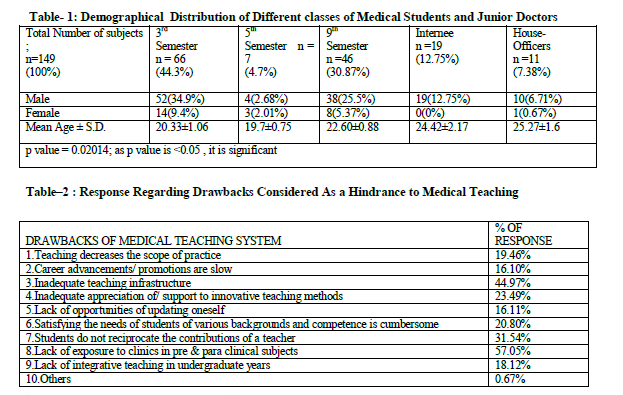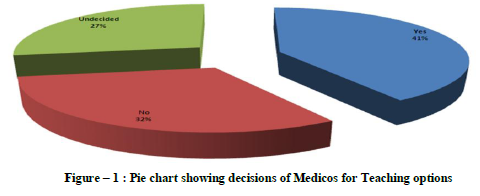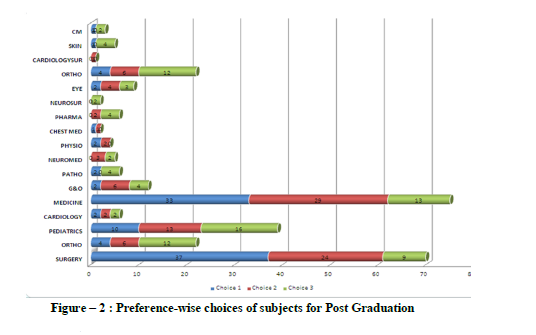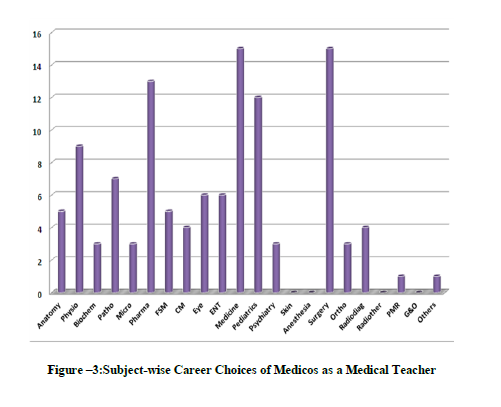IJCRR - 5(21), November, 2013
Pages: 34-39
Date of Publication: 21-Nov-2013
Print Article
Download XML Download PDF
CAUSES OF DEARTH OF MEDICAL TEACHERS IN SOME SPECIALITIES : A CROSS- SECTIONAL OBSERVATIONAL STUD
Author: Lopamudra Dhar Chowdhury, Ranjan Basu, Avijit Hazra, Tanmoy Biswas
Category: Healthcare
Abstract:Objective: At present there is a deficit of 30-40 % medical teachers in the existing 345 medical colleges in India. This study was done to find out the percentage of medical students who desire to opt for medical teaching, the subjects chosen for their future career and the major factors which influence their decision making were assessed to explore the possible causes of dearth of medical teachers in some specialities. Settings and Design: The study was a cross sectional observational study, done among the medical students and junior doctors in IPGME andR , Kolkata. Methods and Material: A cross sectional questionnaire based study was done on students, interns and house officers of Institute of Post Graduate Medical Education and Research, Kolkata. The answers were treated as confidential and their views and opinions were analyzed statistically. Data obtained was analysed and presented in counts and percentages and chi square test or Fisher's Exact Probability test as applicable. Results: Data collected revealed that out of 149 medicos, 146 (97.99%) were willing to do post-graduation, 3 (2.01%) were undecided; 61(40.9%) wanted to opt for medical teaching, 47 (31.58 %) did not while 41 (27.52 %) were undecided. Regarding the subjects chosen for post-graduation, Surgery, Medicine and Pediatrics held the priority followed by Orthopedics and GandO. Pre and para-clinical subjects were chosen by 4.02%. 132 wanted pre-PG subject counseling. The major drawbacks of the present medical education system were found to be, lack of exposure to clinics in pre and para-clinical subjects, inadequate teaching infrastructure and students not reciprocating the contributions of a teacher. Conclusions: Various factors influence the ultimate career choice of medical students. Exploring and sorting out the deterring factors which hold them back from medical teaching specially the dearth subjects could perhaps help to tide over the present crisis of dearth of teachers.
Keywords: medical teacher, dearth , speciality
Full Text:
INTRODUCTION
The demand of medical colleges in India is ever increasing, though the student: teacher ratio in the Medical Education System is disheartening. At present as on July, 2013, there are 381 medical colleges in India, to provide MBBS course to 50068 medical students (1,2). There is about 30-40% deficit of Medical Teachers in various
specialities (3). So, we cannot expect a turn-out of good doctors to serve the community in the present scenario of deficit of inspiring teachers. At present, the student: teacher ratio is 2:1 to 3:1 whereas according to MCI norms, 1:1 is the target (3). Many of the students in the medical profession are keen in clinical practice rather than treating medical teaching as a good career option. Various factors influence the ultimate career choice of the students at the time of admission to the course (4,5) . As some career options are overlooked by the students (6), the deterring factors which hold them back from opting for medical teaching can be sought for to tide over the present crisis.
MATERIALS AND METHODS
A questionnaire based cross sectional survey was done. Two hundred structured questionnaires were distributed among students of various semesters, interns and house officers of IPGMEandR, medical college of Kolkata , West Bengal after obtaining ethical clearance from the institutional ethical committee. The participants were assured that the answers would be treated as confidential and taken with their consent. The questionnaire requested their personal choice regarding post graduation, their preference for teaching and the drawbacks which they consider are a hindrance to teaching. The answered questionnaires were collected and the properly filled up, valid answer sheets (n= 149) were analyzed statistically for significance.
Statistical Analysis
The data were entered into an MS Excel worksheet. Categorical demographic variables, their subject choice of post graduation, the preference for teaching, the drawbacks considered as a hindrance to teaching were presented in counts and percentages and compared using the Chi-square and Fisher exact tests as applicable.
RESULTS
Out of 149 medicos, 146 (97.99%) were willing to do post-graduation, 3 (2.01%) were undecided; 61(40.9%) wanted to opt for medical teaching, 47 (31.58 %) did not while 41 (27.52 %) were undecided (Figure-1). The demographical distribution of different classes of medical students and junior doctors regarding age and sex were found statistically significant (Table –1)
Regarding the subject choice for post graduation, Surgery, Medicine and Pediatrics were chosen by the majority, followed by Orthopedics and Gynecologyand Obstetrics. Pre and Para clinical subjects were chosen by only 4.02% (Figure –2) .
Regarding option for teaching, subjects like Medicine, Surgery held the priority followed by Pharmacology, Pediatrics and Physiology. Subjects like Skin, Anesthesiology, Radiotherapy and Gynecology and Obstetrics were not chosen for teaching (Figure -3). The disparity in teaching subject choice is perhaps due to non exposure to some subjects in undergraduate years.
The drawbacks associated with teaching as a career were analyzed and it was found that lack of exposure to clinics in preclinical and para clinical subjects, inadequate teaching infrastructure and students not reciprocating the contributions of a teacher were responded by majority (Table -2).
DISCUSSION
The number of medical colleges in India over the past 15 years has more than doubled but the human resource in the form of medical teachers has not kept pace in fulfilling the MCI criteria . The gross deficit of medical teachers has led to unethical practices during MCI inspection (7) . With the present criteria, over 2000 teachers are required in Medicine, surgery and community Medicine; 1600-2000 teachers for Anatomy, Physiology, Pathology andAnaesthesiology; 1000-1500 for Pharmacology, Paediatrics, Ortopaedics , Gynaecology and Obstetrics, Radiology. As teachers are required for both undergraduate and postgraduate courses, the deficit of medical
teachers should be urgently sorted out. In 1997, the MCI guidelines were modified to give a clear direction towards small group teaching. For small group teaching–learning activity, the teacher requirement would exceed the minimum numbers prescribed by the MCI. Hence, the whole issue of human resources in the form of medical teachers requires a thorough reappraisal on an urgent basis if the system is not to fail (7) . Considering the large number of faculty required, there is an acute shortage of teaching manpower in medical colleges both in the long standing and newly started ones. This shortage is in the region of 20%–25% in most departments and as high as 33% in some departments. The shortage is mainly attributable to non-availability of qualified personnel willing to take up employment in medical colleges on the current terms and conditions (7) . The crisis is so acute that MCI has undertaken some strategies like re-employing retired teachers, extending the age of retirement of teachers, even decreasing the experience required for faculty posts to tide over the present crisis (3) .
In this study participants were from various semesters as well as interns and house-officers. It has been seen that the preclinical and clinical training period can be used to influence the speciality preference in future years.(8,4). Moreover, career preferences change dynamically as the students progress through the course and are exposed to different specialities (9). There are various factors which influence the ultimate turn-out of medical teachers in various specialities. A recent survey shows that some subjects like Anatomy, Biochemistry, Physiology, Forensic Medicine and Pathology had no takers. This study shows that choices have changed. It is also likely that their choices would change in subsequent years (10). As many post-graduate seats in the pre/para - clinical subjects remain vacant over the years, it implies that deficit of medical teachers in these specialities would be bound to occur in the near future (11). Some career options are overlooked by students (10). A proper career counselling of medical students could perhaps open up newer avenues for the upcoming post graduates. In this study, 88.5% of participants had voted for pre-PG subject counselling for appropriate subject choice for future career. It has been seen that students who opt for subjects without proper prospective knowledge of the subject may not have much passion for, or commitment to the subject, resulting in mediocrity and frustration (12) . In addition, understanding of factors that influence their career decisions is also important (13). Hence screening of the factors, which actually deter the candidates from opting for a teaching career should be sorted out at an early stage. In previous studies it was seen that factors like career stability, reputation, lifestyle and income influenced career choice of students of India and abroad (14). In this study, other drawbacks specially of the medical education system, were placed before the participants for their opinion. Sorting out the underlying factors and proper career counselling could perhaps avoid either overcrowding or scarcity of postgraduates in different specialities (15,9) . Thereby, the valuable post-graduate seats would be utilized rather than being wasted bringing hope for better turn-out of medical teachers in at least certain specialities. Up gradation of the present teaching infrastructure, involvement of pre and para clinical medical teachers in clinics perhaps initiation of integrative teaching would attract many students towards teaching.
Career choices are dynamic and likely to change over time, however if the disinclination towards some subjects persist, there is likely to be a scarcity of teachers in pre and para clinical departments (16,17) .
CONCLUSION
As this study was carried out on a small groups of students of various category of a single teaching institution, further multicentric studies involving more participants specially of final semesters or interns would perhaps bring out more information
regarding the causes of deficit of medical teachers in some specialities. Further studies involving exploration of the underlying causes which keep away students from selecting some subjects for their future career and measures to make these subjects attractive should be undertaken urgently to achieve the target of attaining student: teacher ratio of 1:1 for all subjects.
ACKNOWLEDGEMENT
Authors acknowledge the immense help received from the scholars whose articles are cited and included in references of this manuscript. The authors are also grateful to authors / editors / publishers of all those articles, journals and books from where the literature for this article has been reviewed and discussed.




References:
- en.Wikipedia.org/wiki/list_of_Medical_Colleges_in_India
- List of MCI recognised and permitted colleges for MBBS course searched in all state, all universities , all colleges as accessed on 15/07/2013 . URL: http://www.mciindia.org/InformationDesk/CollegesCoursesSearch.aspx.
- Ananthakrishnan N.Medical Education in India: Is it still possible to reverse the downhill trend?. The National Medical Journal of India 2010; 23; 156-60.
- Wright B , Scout I, Wolochuk W.Brennies F, Bradley J. Career choice of new medical students at three Canadian universities; Family medicine versus speciality medicine. CMAJ 2004;170; 1920-4.
- Wright B, Scott I, Powis D, Wodochuk W, Henry R, Turnbull D, et al. Career preferences of new medical students at four Australian universities; Rural family medicine versus the rest . Aust J Rural Health 2006; 14; 229-30.
- Mutha S, Takayama JL, O’Neil EH. Insights into medical students’ career choices based on third and fourth –year students’ focus- group discussions. Acad Med 1997; 72; 635-40.
- Ananthkrishnan N. Acute shortage of teachers in medical colleges; Existing problems and possible solutions. The National Medical Journal of India 2007; 20; 25-9.
- Harris MG, Gavel PH, Young JR. Factors influencing the choice of speciality of Australian medical graduates. Med J Aust 2005;183:295-300.
- Khader Y, Al-Zoubi D, Amarin Z, Alkafagei A,Khasawneh M, Burgan S et al. Factors affecting medical students in formulating their speciality preferences in Jordan.BMC Med Educ 2008;8:32
- Huda N, S, Career preferences of final year medical students of Ziauddin Medical University; Educ Health (Abingdon) 2006;19;345-53.
- Kumar R, Dhaliwal U. Career choices of undergraduate medical students. The National Medical Journal of India 2011; 24; 166-69.
- Shah SU. The medical students’ dilemma; Which postgraduate specialty to pursue? J Postgrad Med 2009;55:294-95.
- Ranta M, Hussain SS, Gardiner Q.Factors that inform the career choice of medical students: Implications for otolaryngology. J Laryngeal Otol 2002;116:839-41.
- Buddeberg,Fischer B, Klaghofer R, Abel T,Buddeberg C.Swiss residents’ speciality choices- impact of gender, personality traits, career motivation and life goals.BMC Health Serv Res 2006;6:137.
- Soethout MB,Heymans MW,Ten Cate OJ.Career preference and medical students’ biological characteristcs and academic achievement. Med Teacher 2008:30;e 15-e22.
- Anand MK, Raibagkar CJ, Ghediya SV, Singh P. Anatomy as a subject and career option in view of medical students in India.J Anat Soc India 2004;53:10-14.
- Anantraman V, Kanya R. MBBS students observations on pre and paraclinical subjects. J Anat Sci 1995;14:31-3.
|






 This work is licensed under a Creative Commons Attribution-NonCommercial 4.0 International License
This work is licensed under a Creative Commons Attribution-NonCommercial 4.0 International License